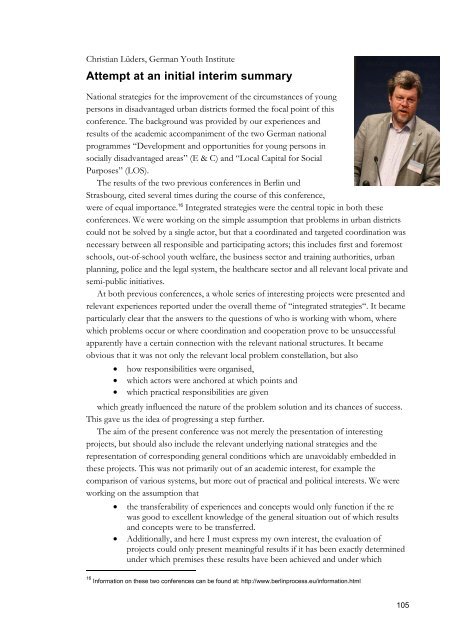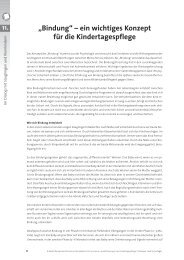download - Deutsches Jugendinstitut e.V.
download - Deutsches Jugendinstitut e.V.
download - Deutsches Jugendinstitut e.V.
You also want an ePaper? Increase the reach of your titles
YUMPU automatically turns print PDFs into web optimized ePapers that Google loves.
Christian Lüders, German Youth Institute<br />
Attempt at an initial interim summary<br />
National strategies for the improvement of the circumstances of young<br />
persons in disadvantaged urban districts formed the focal point of this<br />
conference. The background was provided by our experiences and<br />
results of the academic accompaniment of the two German national<br />
programmes “Development and opportunities for young persons in<br />
socially disadvantaged areas” (E & C) and “Local Capital for Social<br />
Purposes” (LOS).<br />
The results of the two previous conferences in Berlin und<br />
Strasbourg, cited several times during the course of this conference,<br />
were of equal importance. 16 Integrated strategies were the central topic in both these<br />
conferences. We were working on the simple assumption that problems in urban districts<br />
could not be solved by a single actor, but that a coordinated and targeted coordination was<br />
necessary between all responsible and participating actors; this includes first and foremost<br />
schools, out-of-school youth welfare, the business sector and training authorities, urban<br />
planning, police and the legal system, the healthcare sector and all relevant local private and<br />
semi-public initiatives.<br />
At both previous conferences, a whole series of interesting projects were presented and<br />
relevant experiences reported under the overall theme of “integrated strategies“. It became<br />
particularly clear that the answers to the questions of who is working with whom, where<br />
which problems occur or where coordination and cooperation prove to be unsuccessful<br />
apparently have a certain connection with the relevant national structures. It became<br />
obvious that it was not only the relevant local problem constellation, but also<br />
• how responsibilities were organised,<br />
• which actors were anchored at which points and<br />
• which practical responsibilities are given<br />
which greatly influenced the nature of the problem solution and its chances of success.<br />
This gave us the idea of progressing a step further.<br />
The aim of the present conference was not merely the presentation of interesting<br />
projects, but should also include the relevant underlying national strategies and the<br />
representation of corresponding general conditions which are unavoidably embedded in<br />
these projects. This was not primarily out of an academic interest, for example the<br />
comparison of various systems, but more out of practical and political interests. We were<br />
working on the assumption that<br />
• the transferability of experiences and concepts would only function if the re<br />
was good to excellent knowledge of the general situation out of which results<br />
and concepts were to be transferred.<br />
• Additionally, and here I must express my own interest, the evaluation of<br />
projects could only present meaningful results if it has been exactly determined<br />
under which premises these results have been achieved and under which<br />
16 Information on these two conferences can be found at: http://www.berlinprocess.eu/information.html<br />
105

















